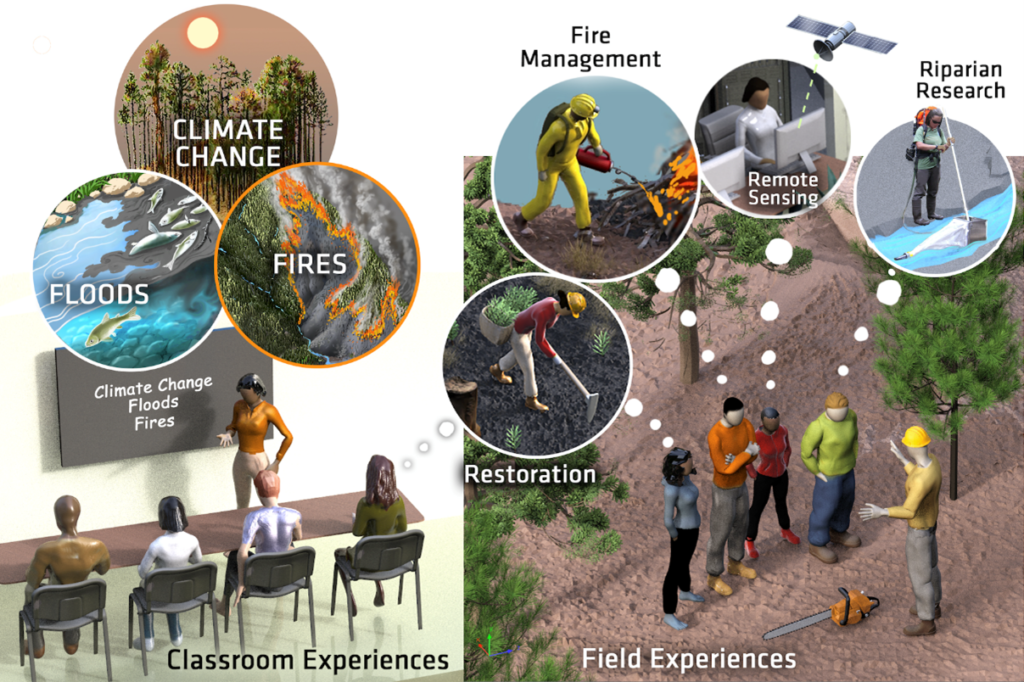Ecological and Social Science Training and Education

Gain experience and career ready skills with ESSTE
ESSTE: A new undergraduate program sponsored by the U.S. Department of Agriculture
ESSTE is a unique, 3-semester internship and mentorship opportunity for undergraduate students to help prepare the next generation to address the challenge of increasing drought, fires, and floods.
Background
The Southwest is facing tremendous environmental challenges as a growing population and a warming and drying climate stress agricultural and natural ecosystems. The future will be dominated by increasing drought stress, more severe wildfires, and increased flood risk and downstream impacts in fire-scarred landscapes – phenomena that are the lived-experience of NAU students and residents of the region. Federal and local governments and agencies recognize the pressing need to develop a large and diverse workforce to meet these challenges.

ESSTE Approach
Through targeted education, training, and networking, the ESSTE program seeks to give NAU undergraduates a head start on careers that will help society meet the challenge of living in and managing our westerns landscapes in a time of rapid change.
ESSTE students have a three-semester experience:
- A first semester seminar class introduces ESSTE students to the overarching ecological and human dimensions of the Southwest. This class is led by 16 NAU faculty across six academic units, experts on diverse social and scientific facets of the environmental challenges of the region.
- During Semester 2, ESSTE students meet with practitioners from local and regional agencies and organizations who are dealing with climate and natural resource challenges. Here ESSTE students learn about workforce needs and the skills that will prepare them to meet those needs. Here to ESSTE students identify their interests for Semester 3, the ESSTE Internship.
- In Semester 3, ESSTE students are paid to work up to 20 hours/week with an agency, organization, government, or research lab, gaining hands-on experience with the kind of position they might seek upon graduation. This internship is targeted to each student’s individual interests in consultation with their internship host.
What can this program provide you?
- A two-semester course (1 credit hour per semester) where you will learn about key issues and job opportunities related to the changing environment of the Southwest.
- A paid summer internship with an agency, organization, or other group that is doing the kind of work you may like to pursue after graduation.
- Contacts and networking opportunities that can help you land a rewarding job.
- A new group of friends and mentors to help you succeed at NAU and beyond.
Meet Our Leadership Team at NAU!
Director of ESSTE: George Koch – Forest Ecology (George.Koch@nau.edu)
Other Affiliated Faculty: Rebecca Best – Riparian Ecosystems & Aquatic Ecology (Rebecca.Best@nau.edu)
Diana Calvo – Environmental Engineering (Diana.Calvo@nau.edu)
Salli Dymond – Ecohydrology & Watershed Management (Salli.Dymond@nau.edu)
Catrin Edgeley – Natural Resource Policy & Human Dimensions of Forestry (Catrin.Edgeley@nau.edu)
Pete Fulé – Forests & Fire Ecology, Ecological Restoration (Peter.Fule@nau.edu)
Jane Marks – Stream Ecology & Stream Restoration (Jane.Marks@nau.edu)
Denielle Perry – Water Policy, Riverine Ecosystem Conservation (Denielle.Perry@nau.edu)
Catherine Propper – Water Quality, Ecotoxicology (Catherine.Propper@nau.edu)
Pranay Ranjan – Environmental Science & Policy (Pranay.Ranjan@nau.edu)
Lucero Radonic – Society & Environment Interactions (Lucero.Radonic@nau.edu)
Andrew Richardson – Global Change Ecology & Remote Sensing (Andrew.Richardson@nau.edu)
Allie Shenken – Forest Ecology & Remote Sensing (Alexander.Shenken@nau.edu)
Abe Springer – Hydrology (Abe.Springer@nau.edu)
Andi Thode – Fire Ecology & Management (Andi.Thode@nau.edu)
Have questions or want more information? Please contact the director of ESSTE George Koch, George.Koch@nau.edu
Read about ESSTE in NAU News!